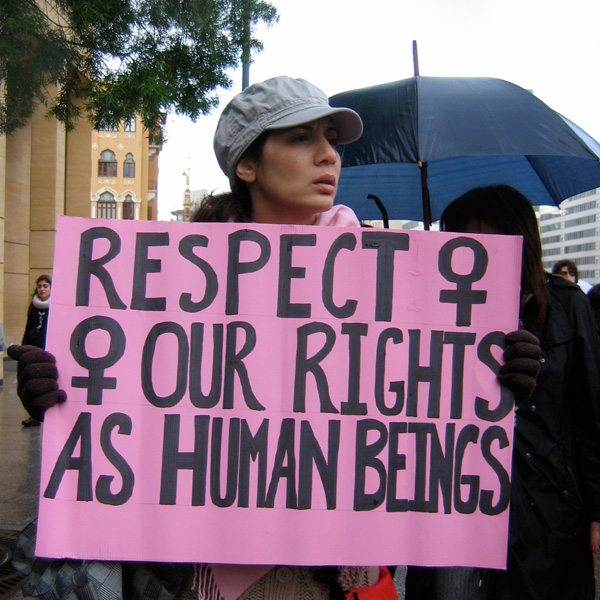Wednesday, May 10, 2017
By Ruba Ahmed, Policy Officer for ActionAid Arab Region Initiative
It’s hard to believe that in 2017 it is legal to rape a woman and face no charge. But sadly, it’s true.
In many countries across the world, men can be “let off” a rape charge if they marry their victim. But in Jordan and Lebanon, where these rules still exist, activists have been fighting to scrap these laws, and pave the way towards a society that favors men and women equally. In the coming months and days, the reform of these laws will be put before Jordanian and Lebanese parliaments, but there is worry among civil society that the reforms may not pass.
Article 308 of the Jordanian Penal Code was relatively unknown until 2014. Wesal Abdullah, a program coordinator at the Arab Women Organization, attributes the lack of awareness on this Article to the view that speaking about matters related to sexual interaction in any way has been a taboo.
“This Article is a product of a societal and cultural environment that enables it,” Abdullah explained. “Until last year, it pardoned perpetrators of sexual assault if they married their victims – a precedent based on the notion that this would safeguard the honor of the victim and consequently her family’s, further protecting her from the double jeopardy of becoming the victim of an honor crime.”
The Article was amended to remove the pardon, with the exception of rape involving a victim aged 15 to 18. In February of this year, the Royal Committee for Developing the Judiciary and Enhancing the Rule of Law proposed the abolition of Article 308 completely. The Cabinet has approved this proposition, and it is currently being debated within the Parliament. While this is certainly a step in the right direction, this legislation has been the topic of discussion for years on end, but complacency towards violence against women has been improperly justified with narrow-minded interpretations of “culture.”
Abdullah added, “Generally, even those who are viewed as liberals, those who lead political parties, respond to the critique of this law with ‘if they don’t get married, what will we do with the girl?’ As a society, we have a great deal of progress to undergo – progress that will take intergenerational efforts to actualize. Sexist and gendered norms are enshrined within our homes, our families, our schools, our streets.”
In Lebanon, Article 522, which deals with rape, assault, kidnapping and forced marriage, has been added to the Parliamentary agenda. In the past, a law aimed at criminalizing sexual and racial harassment was voted down by Parliament, and even met with mockery by the majority male members of the Parliament – a clear demonstration of the power of privilege to trivialize matters that have no effect on the privileged. However, this time round, reform on legislation shows great promise.
Alya Awada, the co-founder of ActionAid’s partner Fe-Male and campaigns manager at ABAAD, a resource center for gender equality, expressed that through evidence-based advocacy, these organizations have sought to not only work on the policy level regarding Article 522, but on changing perceptions as well. Similar to the issue of awareness in Jordan, a poll conducted by ABAAD showed that only 1% of those polled knew that this law existed.
In contrast to prevalent views in Jordan, Awada ascertains, “In Lebanon, we don’t hear the sort of discourse that somehow ties rape to honor; every time we have discussed Article 522, we were met with shock that this law even exists – whether we were speaking to ordinary citizens, politicians, or influential figures. Everyone expressed shock that we have a law that protects rapists.”
Awada affirmed the importance of using real life stories of women to share their experience and say to decision-makers: “This law that’s in place is being used by my family to force me into marriage, it’s being used by a rapist to force me into marriage, it’s being used by religious figures to coerce me into marriage and it’s being used by society to pressure me into marriage.” ABAAD works within the general principle that rape is a crime and must therefore be criminalized.
Further, Awada expresses, “We must sever all ties between rape and a woman’s honor because linking them is an infringement on a woman’s dignity and rights.”
As an organization working to harness the active agency of women to challenge discriminatory social and cultural structures, ActionAid considers the privileging of men over women a gross injustice. Through our work with partners in Lebanon, Tunisia, Egypt, and Jordan, we have sought to address these structural issues. As a consequence of policies that are inherently discriminatory based on gender, the intersectionality of women’s issues and the violence that these result in is evident – whether it is in relation to freedom of movement, availability of facilities in their communities, unrelenting forms of sexual harassment, or restriction of their civil and political participation.
Article 308 of Jordan and Article 522 of Lebanon personify the sexism and violence against women that it is imperative to eliminate. The work of organizations such as Fe-male and ABAAD in Lebanon as well as the Arab Women Organization of Jordan is paving the way for this progress, and the results of their current legislative reconsideration will surely serve as an indication of the directions in which Jordan and Lebanon are moving.


